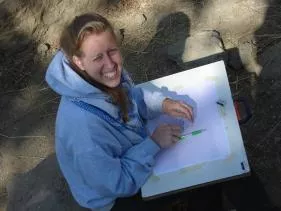Graduate students are part of a long tradition of international studies at the college. As part of International Education Week at Bryn Mawr College, a number of students from the Graduate School of Arts and Sciences and the Graduate School of Social Work and Social Research agreed to answer questions highlighting aspects of their research.
Tracey Cian | M.A. in Classical and Near Eastern Archaeology | Home Country: Italy
What attracted you to completing your graduate studies at Bryn Mawr?
The main reason I came to Bryn Mawr is because one of the major experts in the archaeology of the Arabian Peninsula is based here and I really wanted to get a Ph.D. with him as a supervisor. I also wanted to experience the American university system. Since I previously experienced both the Italian and the British systems, I wanted to get a more rounded and global education.
Please describe your research interests or current research at the college.
My research interests include societal aspects of the Arabian Peninsula in the Bronze Age and Iron Age, liturgical features of the Arabian Peninsula, Elam and Mesopotamia in the Bronze Age and Iron Age, and Pre-Islamic and Islamic pottery from the Gulf and their connections to wider regions, including South-East Asia and China. My hope is to continue research from my previous M.A. thesis at a Ph.D. level, i.e. understanding the Iron Age snake cults of south-eastern Arabia - why they were so prominent in the region and where they came from, if it was an autochthonous religion or if it was imported from the neighbouring areas.
How would you say studying at an American university differs from and contributes to your education as an international scholar?
Studying at an American university is certainly a different experience for me - I was used to universities which employed either only oral or only written exams, whereas here professors tend to mix the two types and, therefore, train you not only to write papers and articles for future publishing but also to speak in front of a group of people and take it as a preparation for future conference speeches. There are also plenty of opportunities for fieldwork and to attend/present at conferences, which is always a plus in the field of archaeology.
